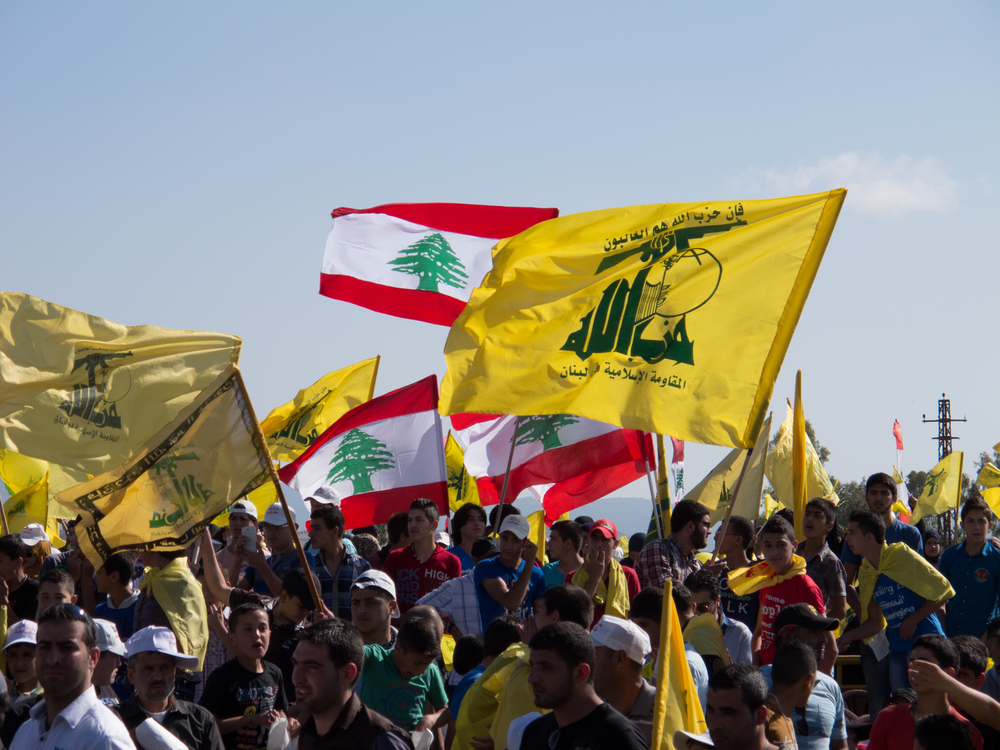by Ali Rizk
On November 13, the State department designated Jawad Nasrallah—the son of Hezbollah leader Sayyed Hassan Nasrallah—a global terrorist. At the same time, the State department announced a $5 million reward for information on two Hezbollah officials, Khalil Harb and Haytham Tabtabai. And that’s not all: The Treasury Department issued a statement accusing Hezbollah of seeking to “undermine Iraqi sovereignty and destabilize the Middle East.” The Treasury Department subsequently announced sanctions on four “Hezbollah affiliated individuals” whom it said were active in Iraq: Lebanese nationals Yusuf Hashim, Adnan Kawtharani, and Muhammad Farhat, along with Iraqi national Shibl al-Zaydi.
This latest escalation against the Lebanese movement fits in with the Trump administration’s increasingly hostile policy against Iran, which has gained steam since the appointment of John Bolton as national security advisor in April.
Following the U.S. withdrawal from the nuclear agreement with Iran in May, the Treasury Department announced sanctions on the leader of Hezbollah, Sayyed Nasrallah himself, along with his deputy, Sheikh Naim Qassem, and three other members of the movement’s Shura council.
In mid-October, the Justice Department designated Hezbollah a top “transnational criminal organization.” Former Attorney General Jeff Sessions declared at the time that the Justice Department had put together a new task force to investigate “individuals and networks providing support to Hezbollah.”
Finally, in his latest statement about the killing of Saudi journalist Jamal Khashoggi, Donald Trump referred to Iran’s support for what he called “the terror group Hezbollah in Lebanon” within the broader context of his demonization of Tehran.
An Israel-First Policy
The Trump administration’s escalation against Hezbollah is yet another example of its “Israel-first foreign policy.” According to well-informed sources in Washington, one of the most common complaints of visiting Israeli figures in recent years has been that the United States was putting too much emphasis on fighting “Sunni terrorist groups” like the Islamic State and al-Qaeda while not devoting enough attention to “Shiite terrorist groups” like Hezbollah.
Since assuming office, the Trump administration has tried to satisfy Israel in this regard. The State Department’s counterterrorism coordinator Nathan Sales said as much during a speech he made at the pro-Israeli Washington Institute for Near East Policy on November 13 (the same day the State and Treasury Departments announced their latest moves against Hezbollah).
Sales described the Lebanese movement as “one of the world’s most capable and worrisome terrorist groups” and said that “Hezbollah’s ambitions and global reach rival those of al-Qaeda and ISIS.” He went on to say that Hezbollah was “not just another political party” and that the Trump administration “rejects the false distinction between Hezbollah’s terrorist wing and a purportedly peaceful “political wing,” describing the movement as “one organization” and “a terrorist organization, root and branch.”
Europe Disagrees
The measures taken by the Trump administration against Hezbollah bear a striking resemblance to the U.S. pullout from the nuclear agreement with Iran. Only Israel and some of Washington’s close Gulf allies support the moves. European countries, on the other hand, continue to distinguish between what they call the movement’s “political wing” and its “military wing” (European states have blacklisted “the military wing”).
Indeed, European countries have made it clear that they intend to keep channels open with Hezbollah, and European ambassadors to Beirut often meet with Hezbollah members of parliament to discuss local concerns and even wider Middle Eastern issues.
A Hezbollah official who spoke on condition of anonymity for this article emphasized this point, referring to “continuing meetings between ambassadors from countries like France, Germany, and Norway with officials from the party.”
Following the results of Lebanon’s parliamentary elections in May 2018, it will be all the more indispensable for European countries—particularly France, a traditional powerbroker in Lebanon—to keep channels open with Hezbollah. In these elections, Hezbollah made significant gains, with 12 of its 13 candidates emerging victorious. Together with its Shiite and Sunni and Christian allies, Hezbollah captured 74 seats, giving them the majority out of 128 seats against rival groups.
Several European countries have also made troop contributions to the United Nations peacekeeping forces (UNIFIL) stationed in south Lebanon. The UNIFIL forces are deployed on pro-Hezbollah turf in south Lebanon to monitor the cessation of hostilities following the July 2006 Israeli war in Lebanon. The sizable troop contributions of Italy, Spain, and France were only made after reaching tacit understandings with Hezbollah.
No Practical Impact
According to the Hezbollah official, the latest punitive measures “would have no practical impact” on the movement. After all, the targeted individuals do not own any financial assets that could be seized.
The official described these moves by the Trump administration as “thuggish behavior” but said at the same time that they were part of “a real confrontation.” He attributed the escalation to “U.S. failures” in Iraq and Syria, along with “Israel’s failure” in the July 2006 war.
Despite the Trump administration’s escalation, Hezbollah appears stronger than ever. The movement has a formidable missile arsenal that includes precision weapons capable of hitting any Israeli target. It has gained vital experience in offensive warfare as a result of its participation in the fight against terrorist groups in Syria and Iraq. Thanks to this activity, the Lebanese movement now has a network of ideological allies that also includes Shiite fighters from Afghanistan and Pakistan.
Ali Rizk has been working in the field of journalism since 2003 including five years in Iran. He is a contributor to Al-Monitor and Al-Mayadeen and has written for other outlets including the Lebanese dailies Assafir and Al-Alakhbar. He is the former Beirut correspondent for Iranian PressTV.






‘Sales described the Lebanese movement as “one of the world’s most capable and worrisome terrorist groups” and said that “Hezbollah’s ambitions and global reach rival those of al-Qaeda and ISIS.”‘
A major difference between them of course being that none of the 19 hijackers who flew planes into buildings on 9/11 were members of Hezbollah.